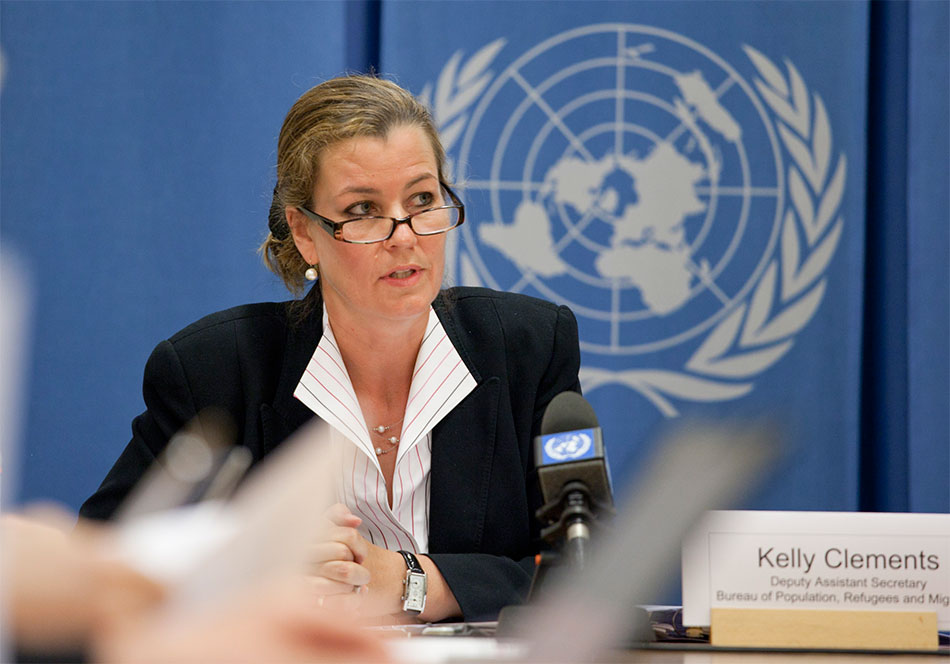
Kelly Tallman Clements '88, '90 is second-in-command at the U.N. agency tasked with protecting an estimated 60 million refugees.
Offering Refuge
by Mason Adams
In 2015, as hundreds of thousands of refugees and vulnerable migrants fled their homes in war-torn regions and arrived in Europe, a Hokie dropped into the heart of the crisis.
In June 2015, Kelly Tallman Clements (French, international studies '88, M.U.A. '90) was named the Office of the U.N. High Commissioner for Refugees' (UNHCR) deputy high commissioner, the No. 2 official in an international agency charged with protecting and assisting those who have been forcibly displaced.
"It's a challenging time to come into the agency," said Clements. "We're facing an unprecedented number of crises. There's the war in Syria, as well as crises elsewhere in South Sudan, Nigeria, Burundi, and Yemen, the last having a direct impact on the Horn of Africa, including Somalia. The Iraq situation continues to displace thousands of people, and there is continued conflict in Afghanistan. There's more displacement now than ever in recent history—an estimated 60 million people."
Clements' new job moved her and her family—husband Andrew and two children—from Arlington, Virginia, to Geneva.
Andrew (biological sciences '86, Ph.D. anaerobic microbiology '92) is a senior technical advisor for the global health security and development unit in the U.S. Agency for International Development's (USAID) Bureau for Global Health, where he works to prevent future pandemics by reducing the opportunities in Africa, Asia, and the Middle East for animal viruses, such as avian influenza and Ebola, to spill over into people. Geneva's central location makes it easier for Kelly and Andrew to travel to locations where UNHCR and USAID provide assistance. In addition, Geneva's international schools have amplified the global perspective that Kelly and Andrew share with their children about the importance of education and the impact of world events on individuals.
"We feel very good about what we're doing," said Andrew. "It's challenging in lots of good and bad ways, and we feel like we're making an important contribution."
The links
Kelly Clements grew up in Maine, where her father ran the Canadian-American Center at the University of Maine, resulting in a steady stream of people from all over the world coming through her house. Interested in public service, Kelly looked to attend a university somewhat near Washington, D.C.
At Virginia Tech, the first day of classes in fall 1984 was abbreviated, so Andrew and Kelly separately had the idea to play golf. Meeting on the course for the first time, they finished the round together.
After obtaining her master's degree, Kelly was recruited by the Presidential Management Fellows program, designed to attract talented individuals straight out of graduate school to serve the public. After Andrew finished his Ph.D. at Tech, Kelly suggested that he look into an American Association for Advancement of Sciences program with a similar public-service aim for scientists and engineers. Their paths have placed the couple at the forefront of global issues.
"We feel like we're both making important contributions in improving people's lives," Andrew said. "But these are complex problems, so there's a lot more work to be done."
Kelly spent her second year in the program with UNHCR in Cox's Bazar, a southeast Bangladesh community where nearly 200,000 refugees had fled from persecution in Myanmar in the early 1990s. Kelly worked with women, men, and children who had "experienced horrible things in terms of persecution—no freedom of movement, no ability to practice their religion, forced to work, no education or health care for their children, all because of their ethnicity," she said. "This was a life-changing experience. The personal interactions with refugees at that time are something that still drives me today. It comes down to the difference we can make in individual lives until they can go home or find another solution to displacement. That was transformative for me."
She's toiled on behalf of refugees, displaced persons, and others in need of international help ever since, mostly through a 25-year career at the U.S. Department of State and now in her current post. During her latter years with the state department, Kelly was responsible for humanitarian issues in Asia and the Middle East, with a budget of more than $3 billion to support global refugee and humanitarian programs and humanitarian policy.
"She's a force of nature, both driven and exuberant in what she does," said Heidi Munger Sung (M.U.R.P.L. '90), who participated in the same fellowship program that led Clements to work with refugees. "It can be a very trying and sad and desperate situation she works with every day. She travels to the refugee camps. She sees it all—but she's a very happy, upbeat, outgoing person."
The connection between the Clements' efforts to assist refugees and fight the transmission of infectious diseases and Virginia Tech's motto of Ut Prosim (That I May Serve) is not lost on Professor Emeritus Jim Bohland, former vice president and executive director of National Capital Region operations and a research leader at the Global Forum for Urban and Regional Resilience.
"To me, one of the important things about the concept of Ut Prosim is obviously the service, but also in not drawing recognition to yourself. This is personified in Kelly," said Bohland, who met Kelly when she was an undergraduate and has remained in contact since. "You [serve] in a way not to bring honor to yourself, but to provide the service. Most of her life has really been dedicated to serving those who are in desperate straits or at points of their lives where survival becomes an issue. That's a pretty thankless job. She's reached out across the world to help millions of people in need of assistance."
Features Winter 2015-16
- Thanks, Coach
- Common Book, Uncommon Learning
- Tale of the Tater
- Offering Refuge